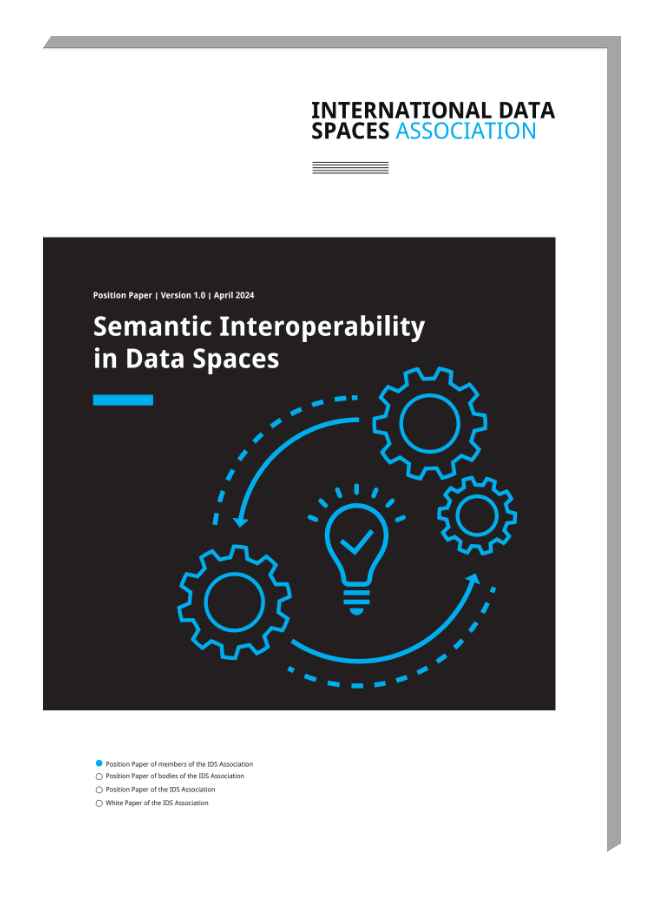Enabling semantic interoperability across
european data spaces
At the heart of this workshop series: semantic interoperability
for Europe’s growing landscape of data spaces.
200
CONTRIBUTORS
31
POSITION PAPERS
3
WORKSHOPS
The Semantic Workshops is an event focused on the development and application of semantic technologies in data management. It aims to foster collaboration among researchers, industry professionals, and policymakers to advance the use of semantic approaches for improving data interoperability, integration, and governance. The workshop covers topics such as ontologies, data semantics, and related technologies, offering insights into how these tools can enhance data sharing and utilization in various sectors. The event typically features presentations, discussions, and networking opportunities to explore innovative solutions and best practices in the field.

Martin Kaltenböck,
CFO, Semantic Web Company
Our mission
The continuously increasing number of Data Spaces and datamarkets in Europe, as well as the related funding lines and regulations by the European Commission regarding the topics of (secure) data sharing of industrial and personal related data as well as research data clearly shows the increasing need to discuss, specify and realise (syntactic and semantic) data interoperability between such data spaces and beyond.
This workshop series and accompanying activities brings together researchers, decision makers and practitioners in the field of the development and operation of European (common) Data Spaces, datamarkets and other web-based data management systems that allow data sharing, trading and data collaboration, to discuss requirements, standards, tools, licenses and more regarding (semantic data) interoperability in data spaces.
Outcomes and results
The main objectives are: to discuss, work on and specify
- requirements for syntactic and semantic interoperability, outcomes will be published freely available under an open license / under open access;
- concrete tools and thereby the provision of a landscape of existing tools and list of vocabularies. All outcomes will be published freely available under an open license / under open access;
- the need for related standardisation, as well as.
Position Papers
As follows all accepted position papers
- Interconnect Semantic Interoperability Framework in support of CERF for energy in data exchange and aggregation in semantic interoperable manner towards alignment with European Energy Data Spaces (3647 downloads ) , Milenko Tošić, Fábio Coelho, David Rua, Barry Nouwt, Gjalt Loots and Daniel Alonso – VizLore Labs Foundation; INESC TEC & U.Minho; INESC TEC; TNO; Big Data Value Association – 2024
- An Evolving Data Space: A framework for unifying domain knowledge and data (3432 downloads ) , Pedro Guimaraes, Antonio C. Vieira, and Maribel Y. Santos – CCG/ZGDV and University of Minho – 2024
- Raising the Role of Vocabulary Hubs for Semantic Data Interoperability in Dataspaces (3339 downloads ) , Robert David, Petar Ivanov, Vladimir Alexiev – SWC, Ontotext – 2024
- Agriculture Data Space for Sovereign Data Sharing and Semantic Integration (3331 downloads ) , Roberto Garcıa and Rosa Gil – Universitat de Lleida, Spain – 2024
- Towards Data Interoperability for the Digital Product Passport Ecosystem (3553 downloads ) , Iván Alfonso, Daniele Pagani, and Jordi Cabot – Luxembourg Institute of Science and Technology (LIST) – 2024
- Establishing semantic interoperability across data spaces: a solution for sharing vocabularies (3387 downloads ) , Wouter van den Berg, Jelte Bootsma, Jan Pieter Wijbenga, Linda Oosterheert, Michiel Stornebrink – TNO – 2024
- Towards quantitative measures of interoperability (3540 downloads ) , Juan Cano-Benito, Andrea Cimmino, Raul Garcıa-Castro – Ontology Engineering Group – 2024
- Cascading Effects Analysis Enabled by Semantic Interoperability in the Resilience Data Space (3447 downloads ) , Federico Gutt, Martin Huschka, Alexander Stolz – Fraunhofer EMI for High-Speed Dynamics, Albert-Ludwigs-Universität Freiburg, Institut für nachhaltige technische Systeme – 2024
- A Semantic Interoperability Toolkit for Sharing Energy Data and Models in a Manufacturing Data Space (3301 downloads ) , Tharindu Ranathuna, Sourabh Bharti, Alan McGibney – Munster Technological University, Ireland – 2024
- Towards a Federated Data and Service Catalogue (3234 downloads ) , Johannes Theissen-Lipp, Ahmad Hemid, Christoph Lange and Christina Gillmann – Fraunhofer FIT; RWTH Aachen University – 2024
- AD4GD semantic interoperability approach for a Green Deal Data Space (3498 downloads ) , Raul Palma, Bogusz Janiak, Rob Atkinson, Piotr Zaborowski, Alejandro Villar, Francesca Noardo, Alba Brobia Ansoleaga, Ivette Serral, Joan Maso Pau, Lucy Bastin – PSNC; OGC; CREAF; Aston University - 2024
- Advancing Cancer Treatment by Strategically Integrating Multimodal Data: Challenges and Opportunities (3451 downloads ) , Haridimos Kondylakis, Angelina Kouroubali, Dimitrios G. Katehakis – Department of Computer Science, UOC; FORTH-ICS; HDHC - 2024
- BDVA’s position paper “Data Sharing Spaces and Interoperability” (2947 downloads ) , Antonio Kung, Ray Walshe and Rigo Wenning – Trialog; DCU; ERCIM – 2024
- IDSA’s position paper “Semantic Interoperability” (3554 downloads ) , Sebastian Steinbuß – International Data Spaces Association (IDSA) – 2024
- Interoperability in Legal Data Spaces (3282 downloads ) , Christian Dirschl – Wolters Kluwer Deutschland GmbH – 2023
- Is X-Road a Data Space Technology? (3534 downloads ) , Petteri Kivimäki – Nordic Institute for Interoperability Solutions (NIIS) – 2023
- Linked Data Schema Repositories for Interoperable Data Spaces (3517 downloads ) , Stier, S., Räder, A., Gold, L., Popp, M., Triol, A. – Department Digital Transformation, Fraunhofer ISC, Würzburg- 2023
- Towards Effective Data Interoperability for Data Spaces (3622 downloads ) , Thorsten Reitz – wetransform GmbH – 2023
- Towards Usage Policy Enforcement in Dataspaces (3553 downloads ) , Andreas Krimbacher, Tobias Dam, Sebastian Neumaier – nexyo GmbH, St. Pölten University of Applied Sciences, Austria – 2023
- Vocabulary Interlinking using Crossovers: Nature FIRST Use Case of Biodiversity (3537 downloads ) , Albin Ahmeti, Robert David, Martin Kaltenböck, Artem Revenko, Jan-Kees Schakel -Semantic Web Company, Vienna University of Technology (TU Wien), Vienna University of Economics (WU Wien), Sensing Clues, Netherlands – 2023
- Semantic Interoperability, a Key Enabler for Good Quality Usage Control (1992 downloads ) , Gonzalo Gil, Iker Esnaola-Gonzalez – Tekniker, Basque Research and Technology Alliance (BRTA) – 2022
- The Vocabulary Hub to configure data space connectors (1930 downloads ) , Wouter van den Berg, Michiel Stornebrink, Arjan Stoter, Jan-Pieter Wijbenga – TNO – 2022
- Design Principles supporting the Creation of Tools for the Interoperability of European Digital Data Spaces and Marketplaces (1991 downloads ) , Achille Zappa and Martin Serrano – NUI Galway, Data Science Institute – Insight SFI Research Centre for Data Analytics Galway, Ireland – i3-MARKET Consortium – 2022
-
The “AluTrace” Use Case: Harnessing Lightweight Design Potentials via the Materials Data Space® (2006 downloads )
, Martin Huschka, Michael Dlugosch, Valérie Friedmann, Elena Garcia Trelles, Klaus Hoschke, Ulrich E. Klotz, Sankalp Patil, Johannes Preußner, Christoph Schweizer, Dario Tiberto –
Fraunhofer EMI, Fraunhofer IWM, fem Research Institute for Precious Metals and Metal Chemistry, Schwäbisch Gmünd, Germany – 2022 - Data sharing in smashHit: Making consent and contracts interpretable with knowledge graphs (1966 downloads ) , Anelia Kurteva, Amar Tauqeer and Anna Fensel – STI – 2022
- Semantic approaches for facilitating interoperability between data driven sources: A case study (1957 downloads ) , Paula Peña, Luis García, Rafael del Hoyo, María del Carmen Rodríguez-Hernández and Rosa Montañés – Technological Institute of Aragon (ITAINNOVA) – 2022
- Data Spaces vs Knowledge Graphs (1993 downloads ) , Vladimir Alexiev – Ontotext Corp (Sirma AI) – 2022
- Do Track – A Do Not Track Use Case (2039 downloads ) , Mark Lizar – 0PN: Consent Public Benefit Consortium – 2022
- Data search and discovery in language data spaces: challenges and solutions (1882 downloads ) , Stelios Piperidis, Penny Labropoulou, Georg Rehm – Institute for Language and Speech Processing, Athena Research Centre, Deutsches Forschungszentrum für Künstliche Intelligenz GmbH – 2022
- Requirements for TRUST semantic interoperability (1944 downloads ) , Sonia Jimenez, Silvia Castellvi, Jörg Langkau – nicos AG, IDSA – 2022
- Start with an identifier (1982 downloads ) , Phil Archer – GS1 Global Office – 2022
Further reading
We invite you to download and read the recently published position paper “Semantic Interoperability in Data Spaces”. This paper was written by members of the IDSA and explores key concepts in semantic interoperability within data spaces, presenting main ideas from the Reference Architecture Model version 4 (RAM 4). It explains how these concepts not only apply to data spaces but also intersect with broader interoperability principles, drawing on best practices from various projects.
It is meant as further reading and is not directly connected to the workshop.

